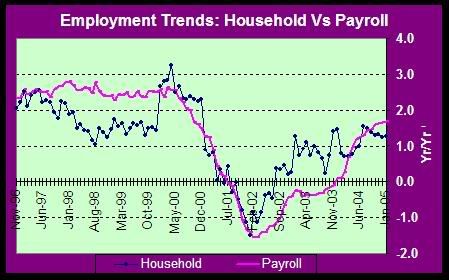Throughout this economic expansion monthly job growth in the Labor Department’s establishment survey (a.k.a. the payroll survey) has understated the strength of the economy and the labor situation.
First of all, if that's the case, then the beloved household survey, much beloved of the Malpasses and Wesburys of the world, must be really understating job growth -- the rate of change in the household survey has been lagging that of the payroll figures for the past few months (see below chart, stolen from Robert Brusca). Gosh, when will these economic data get on board for the big win?

Malpass continues:
Job growth in the establishment survey hasn’t been a good indicator of the employment situation in recent years. It overstated job growth in the late 1990s and has been reverting to normal this decade.
My, isn't that convenient?
In July 2000, employment in the establishment survey reached an impossibly high 98.3 percent of the household survey. The establishment survey, a complicated statistical sample, did not keep up with changes going on in the U.S. economy and hence overstated jobs.
I guess this is just an NRO hack job, so explanation isn't necessary. But why is it impossible for the establishment survey to reach 98.3% of the household survey? Is that even meaningful? The two are entirely separate surveys. Couldn't this be a mere statistical quirk?
He goes on to suggest that the payroll survey was overestimating job growth in the 1990s because so many people had jobs with big companies, and people changed jobs a lot. Thanks for that, Mr. Economist. Yes, that's correct, the payroll survey reflected that the job market was extremely strong in the 1990s. He then goes on to explain that the payroll survey is underestimating job growth in the 2000s because it's been a time of extreme volatility in job growth and interest rates. Right -- there's been a recession and a bunch of other crazy stuff going on, as anybody who's read a newspaper could tell you. Hence, the job market has been lousy. Again, no PhD necessary.
But Mr. Malpass has a PhD in bullshitting, apparently, as he goes on to explain to us that: "The view that the participation rate in the economy is low or plunging is simply wrong." The labor-force participation rate is 65.8%, and it's been almost that low for much of the past year. Since 1988, during all the times of economic change to which Malpass refers, the participation rate was higher. Suddenly, though, he wants us to forget about all these economic changes, on which he bases his previous flimsy arguments and to accept that turning back the clock to the 1988 rate of labor-force participation is hunky dory.
Nice try, Malpass, but no cigar.
No comments:
Post a Comment